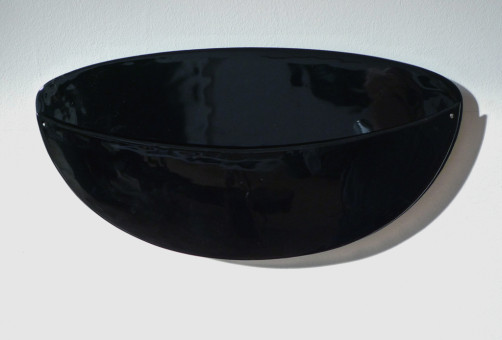
Joachim Bandau
“Well, Cassady was a benign version of that figure. Gary Gilmore may be closer to what I mean, a vicious drifter of the kind America seems to produce in greater quantity than does any other country, probably because there is no moral center to our middle class. This society is so fractured. It never really had that period of high bourgeois cultural development that most European countries had. The American underclass has never had the tradition and stability of a European peasantry so it could never develop feudal loyalties. Instead we get these institutionalized personalities whose arrested emotions oblige them to mimic mood, feeling, love. This is the origin of their violence.”
Robert Stone
Interview with, Paris Review 1985
“I am more impressed than ever about how totally indoctrinated
is Hollywood.—For those of you unfamiliar with George Clooney’s MO,
when he’s not accepting Lifetime Achievement awards and saying “ Je
suis Charlie ,” he’s denouncing the Official Enemies of his favorite
state. Clooney really knows how to fake it. And remember, in the States,
this counts as courage.) ( PS . The only thing missing from the 2015
Golden Globe Awards was video of United Nations High Commissioner for
Human Rights Special Envoy Angelina Jolie sharing Thanksgiving dinner with
U.S. troops as the United States blows up yet another country.)”
David Peterson
“The Arabs joined the non-aligned world, which was undergirded by the global struggle against colonialism as described by Fanon, Cabral, Nkrumah,and Cesaire….For Freud, writing and thinking in the mid 1930s, the actuality of the non-European was its constitutive presence as a sort of fissure in the figure of Moses – founder of Judaism, but an unreconstructed non-Jewish Egyptian none the less.”
Edward Said
This was a week in which politics as spectacle was dialed up to previously unimaginable levels, and a week in which mass culture, meaning especially Hollywood, overlapped in unusual and revealing ways. It was also the week that one of the great novelists of the last forty years died. I will get to Robert Stone but first, it is hard to have avoided the narrative construction built around the Charlie Hebdo assassinations. Firstly, much like the Boston Marathon bombing, the official story is rather too familiar. It feels very much like the work of patsies, and the fact that the police commissioner in Paris committed suicide right after the arrest only further adds to the surreal nature of this entire storyline. But most important is the public reaction, carefully guided by media. And then the egregiously grotesque spectacle of Netanyahu and Sarkozy and Hollande and Merkel waddling down the street for their cherished photo op. This is the obvious anti Muslim theme of Western states in full bloom. Watching war criminals and their stenographers joining in this appropriation of other legitmate protest, serves as distraction and erasure. That Charlie Hebdo was itself a vaguely distasteful and pretty racist bit of irrelevancy is totally beside the point. I am sure more details will emerge. Jonathan Cook has written a pretty succinct summation of the absurd official story.
http://www.jonathan-cook.net/blog/2015-01-13/what-hebdo-execution-video-really-shows/
But for now the Golden Globes took place and photographers could be seen handing out the ‘Je Suis Charlie’ signs to various and sundry celebrities so they, too, could pocket their cherished photo op. Instant credibility, and seriousness. Meanwhile, it is instructive to look at what films and TV won awards. (Remember that the Golden Globes were once the butt of jokes, where Pia Zadora had her *future star* award bought by her husband, and the foreign press service was viewed with disdain by most Hollywood influence peddlers).

F. Parizot, Agence France Presse photo. Casbah, Algiers 1962.
From Wes Anderson’s twee The Grand Budapest Hotel, to HBOs turgid white person melodrama The Affair, there was a seamless adherence to work ratifying the status quo. This was all work that held up the superiority of Western society, of petit bourgeois sensibility, and the values of the affluent quasi liberal. It is too tedious to list all of this and it depresses to do so, but as a side bar note this is the week (roughly) in which the soft core Gary Webb biopic came out, and the season that saw the one other formally *dissident* bit of drama, Selma. I only wish to remark that Selma was the slightly more disturbing of the two by virtue of its mushy aesthetic core. This was a Doctor King as small and earnest, not majestic and revolutionary. I did rather enjoy, for once, Tom Wilkenson’s performance, an inspired bit of casting as LBJ. Directed by 42 year old Ava Marie DuVernay, a black woman graduate of USC whose wiki entry informs the reader that disillusioned with journalism (she had been an intern for Connie Chung) she turned to publicity. Well, yeah, that makes sense. This is a slick film, made for broad approval and certainly geared not to offend. It is a revisionist Martin Luther King, and one that shrinks before our eyes. Never mind the portrayal of Malcolm X, which was simply…well….bizarre.
As is usually the case, such awards shows are paeans to in the inherent goodness of the culture industry, and it fit well with the Netanyahu/Sarkozy perp walk in Paris. The ‘White People are Special’ parade.
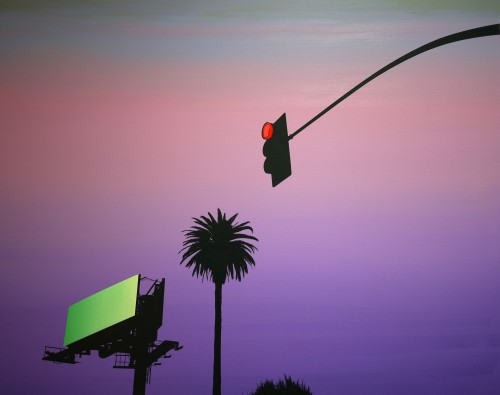
Glen Rubsamen
David Peterson wrote: ”
“To the victims of military occupation; to the people in the houses that
bore the brunt of “shock and awe” bombing in Iraq; to those whose
bodies were disfigured by white phosphorous and depleted uranium; to the
parents of children who disappeared into the torture cells of Abu Ghraib;
to all of them – what but cruel mockery is the contention that Western
“civilisation” fights its wars with the pen and not the sword?
And that is only to concern ourselves with the latest round of atrocities.
It is not even to consider the century or more of Western colonial
policies that through blood and iron have consigned all but a tiny few
among the population of the Arab world to poverty ajnd hopelessness.
It is not to even mention the brutal rule of French colonialism in
Algeria, and its preparedness to murder hundreds of thousands of Algerians
and even hundreds of French-Algerian citizens in its efforts to maintain
the remnants of empire. It is leaving aside the ongoing poverty,
ghettoisation and persecution endured by the Muslim population of France,
which is mostly of Algerian origin.
The history of the West’s relationship with the Muslim world – a
history of colonialism and imperialism, of occupation, subjugation and war
– cries out in protest against the quaint idea that “Western values”
entail a rejection of violence and terror as political tools.”
Hollywood continues to produce shows and films that are staggeringly white supremacist, and more, are consistently Orientalist. Just a quick viewing of some episodes from Homeland, Madame Secretary, State of Affairs, Tyrant, The Last Ship, to name only a few, will provide evidence of this. But this is all pretty obvious and really hardly needs repeating yet again. What is of more interest I think is to examine a few examples of more ambitious film and TV, in the light of this week’s political burlesque. Paul Thomas Anderson’s career has been fascinating if frustrating. But with The Master, from two years ago, he seemed to have found, finally, a meshing of his technical cinematic skill with the perfect story, a story that encapsulated all the preoccupations that had surfaced in spots throughout his earlier films. But it always hard to follow up such an artistic success. Anderson decided to transfer Thomas Pynchon’s most recent novel, Inherent Vice into a film.
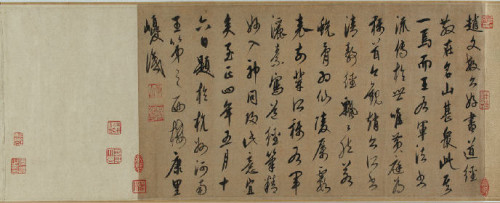
Daoist Scripture of Constant Purity. Zhao Mengfu, calligrapher of the Yuan dynasty. 1292.
Now, it is essentially impossible to do this successfully. And that is likely why it was chosen. I understand that, and I think it’s maybe even a wise instinctual move. So from the start the problems are sort of evident in ‘Vice. How much are to be laid at the feet of Pynchon — not counting just the impossible factor — is hard to say. The clearest ancestry for Inherent Vice is Altman’s The Long Goodbye. This was also a detective as myth project, and it was also Southern California. And SoCal occupies its own very particular mythos, and one that has resisted film expression more often than not, but one that is intimately linked (obviously) to Hollywood. I’m not an Altman admirer, particularly, so I was never going to really be on board with ‘Vice. That said, Anderson does possess remarkable cinematic vision. This film is shot in 70mm, is deceptively beautiful, and I have to say absolutely riveting while viewing. At least for me. But maybe two thirds into the film I started to feel myself questioning the project, riveted or not, because unless this was going to be a ten hour film, the looming incompleteness started to encroach on every scene. And every scene began to feel less justifiable in it’s fragmentary and elliptical placement. And this sounds like something one could say of Pynchon, too. Since Crying of Lot 49, and certainly Gravity’s Rainbow, Pynchon has been both monumental and trivial in equal measure. There was always something self admiring in Pynchon, and I think in some weird cosmic synchronicity the death of Robert Stone this week serves as a side bar commentary on Pynchon. There are American prose writers; Gass, and Gaddis, Barth and Barthelme, who emerged in the second half of the 20th century out of whose group Pynchon emerged as the clear star. Of the rest it’s possible only Gass can claim any real traction, today, but the heavyweight champ of that epoch is undoubtedly Thomas Pynchon…at least in the undergraduate imagination. I cant remember a book shelf during the 70s that didnt have Gravity’s Rainbow on it. Pynchon felt like the anti-Irving. A random sampling from ‘lists of the best novels of the last fifty years’ (etc) will include for sure at least two Pynchons. In not one list did I find Robert Stone. Not one. Shit, even rubbish like James Ellroy made several lists. But this is the nature of mainstream media lists. I suspect if I polled English lit professors I would find more Denis Johnson, Tim O’Brien and Maryanne Robinson. Probably some Gass, too. But Stone I suspect not. Richard Ford made a few lists, so did Joan Didion. But Stone came out of a lineage that includes Melville and Conrad, and probably Poe. It is a decidedly unfashionable lineage today. It is sincere writing, it is writing in search of meaning, and it feels closer to Sartre and Camus than it does to Updike. Certainly it is the apotheosis of Palahniuk. Pynchon however, was something else altogether from the Melville to Hemingway through line, and what that is might be hard to describe. Updike suggested he didn’t like the cosmos that Pynchon created, because it was leaden. Updike didn’t like the funny names, either. Gore Vidal said Pynchon marked the end of the American novel (as in *killing* it). All of this is sort of true, I think. Pynchon has always felt just slightly too self conscious, too in need of de-coding. There is no David Foster Wallace without Pynchon, and there is no Cormac McCarthy without Stone. You can draw your own conclusions about who to blame in all that. But Wallace’s virtues, limited though they are, are in spite of the Pynchon effect. So, back to Paul Thomas Anderson and his adaptation of Pynchon’s 1992 novel.
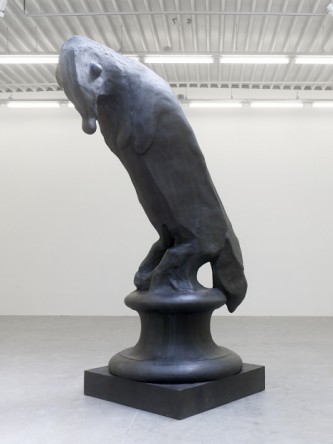
Johan Creten
Or rather, to his gloss on Robert Altman. Anderson is a vastly more talented artist than Altman. More grand, though probably that is also his greatest flaw. The operatic isn’t gauged well in Anderson. In fact for all the sort of virtuosity, Anderson loses control of his projects. Inherent Vice got free of his hold about the third frame of the credit sequence. This isn’t to say I think its not among the better films of the last few years, because I do. Sort of. If Anderson is using Pynchon to explore the Raymond Chandler world view, the film never finds that core essence, at least to my mind, at least not *my* Chandler. The El Lay of the mind resides in Fante, Nathaniel West, and James Cain even, as well as Chandler.
Mysteries don’t have to be solved, in fact are often, if not usually, more interesting and valid if they aren’t solved. But, the ‘not solving’ has to be there, the narrative has to take the reader to the place where ‘it cannot be solved’. Anderson is really only saying, oh, there are mysteries here, plots, conspiracies, all kinds of things…. but we won’t be getting into any of that. Come along now, lets look what’s over here.
*The mystery*, really, of course, is never solved. That is the hidden truth of all crime and mystery narrative. The secret truth of mystery is that we are ourselves the mystery. Anderson’s film never gets anywhere close to having that discussion. The Master did, and that is why it is so significantly better a film. That all said, Inherent Vice is a film of great complexity, as film. That is what Anderson is, a filmmaker. His mise en scene, if you will, is what allows one to forgive his indulgences, his anachronisms (not they are not Pynchon jokes…at least I don’t think so) and his failure to fully ever grasp ‘place’. In There Will Be Blood, the sense of place was certainly foregrounded, and yet…and yet it was a reader’s digest version of historical place. I dont know if this is just something one learns (Anderson is only 44) or if it’s only me that thinks Anderson is an acutely immature artist, still.
But, Anderson is not trivial, even when he bases his films on a writer whose chief defect might be well his juvenilia. Anderson is serious, too, and for that I will forgive most anything these days.

Post Office, Truth or Consequences, NM. Nick Waplington, photography.
Robert Stone is the *not* post modernist. He is often called a realist, but usually what the person saying that means is that he is a modernist. Stone though wrote wonderfully cauterized prose, books that feel like ship interiors, in that nothing not needed intrudes, and yet, everything is in fact there, just stowed away properly. Stone is related in ways to everyone from Conrad and Melville, to Le Carre, Graham Greene and indeed, Raymond Chandler. Or perhaps more Dashiell Hammett. Stone was not an MFA creation, neither was he a pulp writer who climbed into *literature*. He was one of those writers who served as guide to his readers. He knew more than us, but he shared what he knew. He was humble, self examining, prideful. And in Dog Soldiers (later a hugely overlooked film, Who’ll Stop The Rain) Stone created the quintessential Viet Nam era protagonist in Ray Hicks. I remember reading that book for the first time and being unable to put it down. I had known men very close, very very close to Ray Hicks. He was that American drifter, noble but capable of viciousness. Lost. On a spiritual quest, but a highly masculine version. I suspect West coast natives, like myself, feel affinity with Stone. He didn’t write of the deserts much, but he might as well have. He wrote of the other absolute space, the sea.
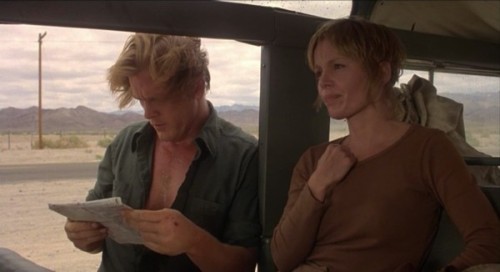
“Who’ll Stop the Rain” (1978), Karol Reisz dr.
Stone knew Ken Kesey, and was a fringe presence in the California (Northern mostly) hippie/artist scene of the 60s. He traveled to Mexico, the Caribbean and then to the stark Yankee New England coast. These were the ripe cultural tributaries for the collective post Sixties consciousness. In Hall of Mirrors a character says “..there are like a few billion people walking around and every one of them has a head with a lot of stuff going on in it…. ‘I want to find out about humanness.”
Stone said something else in that interview from 1985…
“My difference with those writers {Gass and Barthelme} is that they take realism too seriously and so have to react against it. I don’t feel the necessity of reacting against it. I don’t believe in it to start with. Realism as a theory of literature is meaningless. I can start with it as a mode precisely because I don’t believe in it. I know it’s all a world of words—what else could it be? I had the curious luck to be raised by a schizophrenic, which gives one a tremendous advantage in understanding the relationship of language to reality. I had to develop a model of reality in the face of being conditioned to a schizophrenic world. I had to sort out causality for myself. My mother’s world was pure magic. And because I had no father I eventually went into a sort of orphanage when my mother could no longer cope. So at the age of six I went into an institution, which taught me to be a listener. I had to deal with all the ways people were coming on to me, had to listen to all their trips and sort them out. Realism wasn’t an issue because there wasn’t any. I always had a vaguely dreamlike sense of things. There was no strong distinction for me between objective and imaginative worlds.”
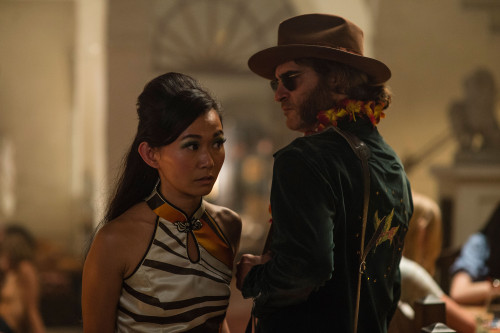
Inherent Vice (2015), Paul Thomas Anderson, dr.
It makes sense that Stone would admire and feel close to Conrad. In the same ways that it makes sense to me that Edward Said loved Conrad. Stone’s work is realistic or not in the same way Conrad is realistic or not. It’s not an issue, because they are so steeped in the emotional reality of the world. The material emotional if you will. Conrad is dispassionate, but acutely tuned to emotion. And that is something that has almost utterly gone missing in American writing over the last thirty years. Utterly. There are certainly maybe two or three fiction writers I can site as exceptions; Richard Ford at his best, and maybe McCarthy at his best. The problem is the best of the rest are inherently minor writers, they are genre writers. Kem Nunn for example, maybe there are others, but it is hard to be as big as Stone anymore. The best writing in fiction over the last thirty years has rarely been in English. Bernhard and Handke, Sebald and Bolano, but there is, I think, a place for Stone in the pantheon. Perhaps not at the top, but close. It is a useful comparison, actually, to look at Inherent Vice and then at Who’ll Stop the Rain. Both based on writers who came into artistic maturity at about the same time. Both were writers shaped by a failed sixties idealism, and by Viet Nam. Both books are about crime, California, and a doomed bittersweet romance. The differences are telling, too. One is paranoid and drugged, the other is romantic and existential, and finally fatalistic. Both are about how dreams die.
Doc Sportello would have understood Ray Hicks, and vice versa. And perhaps that is important.
In the shadow of, as someone put it, a new moral hysteria courtesy of whoever planned to knock off a few aging grey cartoonists in Paris, the better to sell Europe and NATO as protectors of the virtues of non-Arab, non-African, non-Asian society. The fact is that the United States today is all but unlivable. It depresses me on a personal level that so many friends I know stay there. There are excuses and reasons and justifications…and often many are valid. But often many are not, to my mind. This is personal, of course, but I cannot think of a country today as unpleasant to live in as the United States. The cultural and social climate that produced Robert Stone and Thomas Pynchon isnt there anymore and that feels sad. One of the things I believe David Foster Wallace also realized was that that moment was gone.

Ken Kesey and Robert Stone, somewhere, 1960s.
Today, the mainstream media encodes its racist message is ways that make it more palatable for wider consumption. As Thomas Deltombe wrote, (paraphrased)…’Islamophobia is a machine for refining crude racism’. This is right of course. And this is the ploy used by many pseudo left journalists and public intellectuals. Take Zizek’s New Stateman op ed. I quote…
“Such thinking has nothing whatsoever to do with the cheap relativisation of the crime (the mantra of “who are we in the West, perpetrators of terrible massacres in the Third World, to condemn such acts”). It has even less to do with the pathological fear of many Western liberal Leftists to be guilty of Islamophobia.”
This is pretty transparent manipulation. The suggestion then is, Islamophobia does not exist. Its pathological, in fact, to believe it does. Its cheap relativism to suggest anything to do with the history of colonial subjugation, of rape and plunder and torture and systematic repression has importance. A machine for refining crude racism into refined *opinion* suitable for the dinner party. The cultural atmosphere, that societal soup that fed the artistic energy of the mid 20th century feels very dead today. Part of that death, the death of art that springs out of experience and feeling and hidden energy, is being presided over by fakes like Zizek, or by Murdoch empire pop scribes, or a moribund Academia — an Academia like an exhausted intellectual mine vein, now in the empty colliery of the soul, spectral figures shuttling around trying to look busy, pretending it is still 1975. Nobody has a cultural destination. There are very little that feels like artistic work. There are growing numbers of trivialities, of amusements.

Alec Soth, photography. “Utah”.
The fact that Pynchon created a detective novel structure for Inherent Vice is interesting (and came up in the thread from the last posting). I am going to wander around this topic a bit, digressing here and there, because I believe it’s that kind of topic. In the 1880s, a student of Lavater named Alphonse Bertillon began to work with the Paris police department using his photographic studies of faces, cataloging physiognomic features and their linkage with moral qualities and abnormal behavior. This was sort of the first racial profiling. Needless to say, the backdrop to such projects was always scapegoating, but was presented as the latest in scientific rationality. As Mary Bergstein wrote: “A sort of predestined social schema was given occupational and moral categories (aristocrat versus criminal for example) provided a teleological substructure for photographic classification of the human face. Ethnic and moral norms together with visible qualities of social class such as inherited ‘nobility’ rarely strayed too far from Lavater’s scale of classical versus anticlassical as an equation for good versus bad in the natural composition of the human head.”
Freud was fascinated with Egypt and it’s linkage (he believed) to Jewish history. The period of Bertillon, and of Francis Galton, and various eugenicists hung in the background during the last decades of the 19th century. Edward Said, in his very last book Freud and the Non European, investigates the ideas of difference and the details that were codified by the Nazis in the Nuremberg Laws. The detective had become a state apparatus for designating *foreign*, for outsider. By 1948, Said posits, the foreigner (meaning non European) of note was the Arab, especially those of Palestine, but also Lebanese and Syrians and Jordanians. There was in the 1930s, in Vienna, a kind of Jewish orientalism that featured varieties of exotic, in salon life, including even Theodor Herzl. This is one of those oddities that might be historical coincidence, but it feels like a page from a Pynchon novel.
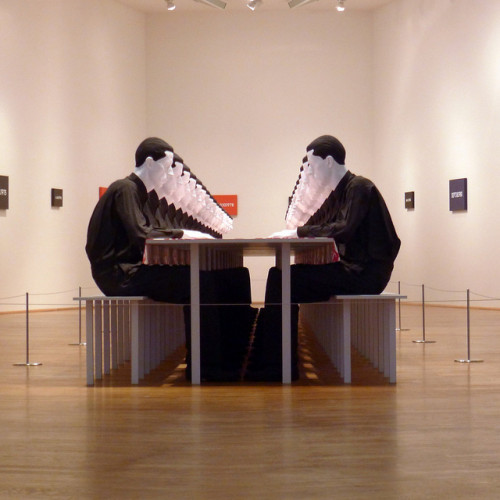
Katharina Fritsch
The detective of Inherent Vice, also a medical doctor, is the detective who searches for his own desire. But where is desire to be found? Pynchon’s real thrust has always been detection, coupled to paranoia. And Inherent Vice is a retroactive detective story with a stoned detective who seems to connect to a dying 1950s white America as well as to the counter culture of Kesey and Stone, the Beats and Viet Nam. There is something one feels is just out of reach in Pynchon, and that is his particular road to the uncanny. In Anderson’s The Master, the sense of historical weight was what really made the concluding ten minutes of the film so effective and poignant. Here I am hard pressed to even remember the last ten minutes. It didnt matter. And that can be alright, but to swerve back to Freud, to Bertillon and eugenics circa 1880, to the salons of Vienna and the rise of the optical instrument, I somehow think that psychoanalysis and the detective are forever joined at the hip and that Said was probably onto something when he looked to excavate the Arab identity from the ruins of colonial history and Zionism and see it from inside but in relation to the Orientalist paradigm. Adorno returned again and again to the figure of the exile. If Moretti is at all right, and I’m not sure, that guilt is individual and conformity equals innocence, then perhaps that is the real point of Inherent Vice; which is in it’s way the point of Dog Soldiers (Who’ll Stop the Rain) and that is that a society of domination has meant that difference is now materially guilty, not just mythically. Bly once said that when a society can no longer distinguish between the mythic and the everyday, that society is sick. The Salem witch trials being the example he used. The ruling class has always needed to create false difference.
The detective novel, and film, or really, just crime story, is always a story of accumulating clues. The discovery of that which is not normally visible. Something left behind, a sign that you were there. Clues are the past. The current fascination with ruins is partly because they are the evidence of a past. In the society of amnesia, today, there is comfort in seeing that not everything is *now*. Of course ruins are more than that. They express defeated desire and hope. But do they?
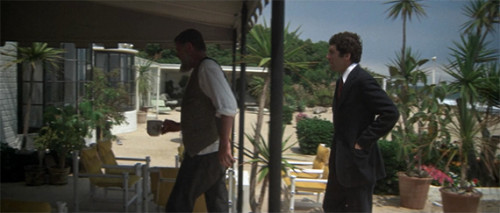
The Long Goodbye (1973), Robert Altman, dr.
This is the nagging doubt attached to photographs of ruins. The detective though, from Sherlock Holmes to Marlowe is pitted against the state. The clue is encrypted with both the story of the criminal, but also of property owners. There is a class dimension to the activity of detection. It is always the story of the private eye vs authority. And when that was lost, in the late 1950s probably, and detection was the province of the state, there was an accompanying change in the nature of clues. Clues became simple ID cards. Ruins are a reminder that the ruling class can lose their foothold. So…clues to TV cops are not expressions of overdetermination. In Holmes or Sam Spade, or Poiret, the clue is ambivalent. The clue feels woven into guilt, not just of the suspect, but of the detective. But from Jack Webb to Dirty Harry, to Batman even, the clue is distanced from the discoverer of the clue. The clue is not psychoanalytic, it is only part of an apparatus of control. The de-facto given now is that criminality resides in the underclass, in some outside, a sort of kitsch Id region where monsters dwell. That term is even used, often, by mainstream media when describing terrorists (Muslims) or criminals. Even liberals and leftists, who can blame the Imperialist West for its violence, will resort to calling the latest villains manufactured by state department PR, *monsters*. As in ‘we created these monsters’. There are no *monsters* at home, in the domesticated ego. Perhaps the psychic creation of *monsters* is a part of the failure of the detective, of finding too few clues, or clues that cannot answer the growing societal demand for completion; that imprint of one dimensionality that advanced technological systems ask for. The private eye is growing archaic. He is now part of the landscape of ruins.
The photographs of sculptures and ancient buildings that Freud loved and collected are of the same index of meaning as today’s ruin-photography. This is the fugitive past, the traces of something now gone, but something that left behind clues. Today, from Eric Garner to the Charlie Hebdo killings, the clues are embedded in videos. Usually the videos are from cellphones, and imperfect, grainy and often the sound is indistinct or missing. Besides the obvious documentary and evidential value of these videos, they are where a certain aspect of sympathetic magic has migrated. The guilt of the detective in his or her search for clues can be found, again, I think, in the talismanic properties of amateur videos. These images are fetishes of evidence, watched repeatedly, analysed and interpreted. The Zapruder film was perhaps the precursor to this. The continuing racist propaganda of the U.S., and its quisling allies and the craven use of NATO as global cop, is somehow an expression of not just Capital, and neo-liberalism, but of what feels like the maimed psyches of the ruling class, and perhaps of white people at large. Looking back it is hard to avoid the obvious shadow of colonialism hanging over nearly everything in Western culture. And looked at through the lens of Freudian analysis, this level of viciousness and absence of compassion speaks to the pessimism of Civilization and Its Discontents. Freud feels very useful right now, as memory and history are destroyed further every day it seems.

very much enjoyed the article, but I think you have misjudged Altman
You know Don…..i went back and watched Long Goodbye again, after writing this. I wanted to like it, to think I had misjudged him, but i hated it even more than when I saw it thirty years ago. Must be me……..because a lot of people I respect think very highly of him.
I think Altman is just very unfocused as a filmmaker. His innovation of everyone talking at once (and breaking the mold re: recording actors individually) never reached the art I felt he was trying to achieve. I’ll have to check out Long Goodbye again.
I admit to a soft spot for some of Altman, in particular MASH. I watched that every year at Christmas with my family from the age of about 6. Mr Altman (and my parents) instilled in me a wonderful distain for authority, both religious and secular.
And on another note, the horror of the MFA programs destroying our ability to understand anything around us continues. I just read a nice write-up of Jen Percy’s article (My Terrifying Night with Afghanistan’s Only Female Warlord) on an Afghan (Tajik) matriarch who is heading up a clan militia. The write up was, oddly enough, from Pando.com: http://pando.com/2015/01/19/the-war-nerd-getting-women-warriors-wrong/
Dear Ms Percy is from the University of Iowa MFA program and it seems to show. Sample dialogue:
“A young girl, maybe four years old, climbed onto Commander Pigeon’s (the matriarch’s) lap.
“What do you want to know?”
“Where are your female fighters?”
“But don’t you want to eat?” she said.
“Not really,” I said. Candy wrappers glittered on the floor and bits of stale food stuck to my feet.
I asked about the first time she took up a weapon.
“When you hold a weapon, you don’t cry, you just shoot.”
She dumped a bag of almonds on the ground and spread them around with her hands. She picked one up, cracked it open with her thumb, and sucked the meat from the shell.
“You guys don’t care about war. You will write your thing and go. I’m killing Taliban twelve months of the year.”
“Will you fight today?” I said.
Her hand dropped and she looked at Sharif. “What is wrong with her?” ”
If that’s the kind of shit writing one learns in a world-renown MFA program (and Ms Percy was also a Truman Capote Fellowship in Fiction) it’s no wonder I can’t read the crap coming out of those programs. The lack of trying to see the world through the other person’s eyes (i.e. compassion) is startling. The whole article sounds like an upper-middle class woman who wretches at the thought of all these dirty rabble and that obviously how Americans live is the pinnacle of civilization. Ugh.
I thought you might like that very fine example of everything you’ve written about MFA programs…
Thanks, M, for the critique you linked to.
“Percy doesn’t seem to know much about Afghanistan. Not once in the story does she tell the reader where her “terrifying night” took place—not even the province in which the “female warlord” operates. That’s kind of a big omission in the Afghan context. In fact, not once does she mention the ethnic identity of the “warlord” and her fighters. That kinda matters in Afghanistan. I’m guessing the woman and her fighters are Tajik, from the north side of the big watershed—and that makes all the difference here—but you wouldn’t know what language the principals speak, what ethnic group they come from, in Percy’s article.”
That’s the crux of the matter, really. The complete inability to see place, history, sheer fucking materiality. Every(privileged)body lives in a simulacra world nowadays — the flattened endless generic backdrop of a video game.
Thanks M.
You know, that write up is representative of a number of things. Its sort of amazing, actually, because the guy writing it is equally clueless (well not quite) and while he certainly grasps the obvious problems with Percey’s article, the thrust is really just more snark. And, one wonders what his CV looks like exactly. Everything is a put down. Im sorry but Cormac McCarthy is not splatter porn. But thats what he is being paid to do…assuming he is paid anything. There is the fatal order of VICE and slate and salon and daily beast and etc …..its entertainment and nothing is really to be taken seriously. Taste is truly degraded in this era. As for Ms Percy, i mean indeed, this is what Iowa Writers workshop is turning out. I have to wonder if at some point these institutions simply need to stop. People are always bemoaning the lack of arts funding and I wonder, well, maybe ALL arts funding should stop. I dont see its doing anything but destroy art. The professionalization of writing and painting has pushed it all very close to Hollywood in terms of the structural dynamics. Professionalization means capitalism, means agents and entertainment lawyers and deals and networking and it means mostly privilege, connections, and for those without connections it means unpaid internships. The entire world of glossy magazines has become distasteful at this point. Its not even vaguely amusing anymore, if it ever was, really. But so saturated is the market now…as the writer of the pando piece does to his credit point out, that its all about creating a brand. Percy;s writing is shockingly bad. Just mind numbing bad, jaw dropping brainfreezing bad. Well….ok…..that was the first thing I read this morning and already I need more coffee………
And now speaking of American Sniper: http://thedissolve.com/news/4507-holy-crap-american-sniper-grosses-over-100-mil-dom/
It grossed $100 million over the 3 day weekend. One of the chaps at the studio said: “It is a cultural phenomenon and a perfect storm…This is the first ‘real’ superhero movie. It performed well in every market, from the smallest town to the biggest cities.”
I seriously have less hope than I already had for the US after reading that. Even with just seeing the trailer a sentient person can tell that the film is the worst type of propaganda. I do believe we will be seeing quite a bit more of the “brave soldier who went to Iraq and had to blast away ragheads to survive and then he got PTSD, oh the humanity!” genre. It feels like a set-up for someone to come out of the military and save the American people – after all, the only place of “purity” seems to be in the military. The father figure to protect us and discipline us. Force and control.
Apropros of nothing, but…. https://www.youtube.com/watch?v=fLwAcU0bYl0
Look at that baby. LOOK AT THAT BABY. He didn’t even bother to put weights in it! I cannot stop laughing.
Oops that link has failed. This one…
https://gma.yahoo.com/fakebaby-american-sniper-latest-controversy-141035925–abc-news-music.html
apropos of American Sniper………..https://samkriss.wordpress.com/2015/01/21/the-last-of-the-cowboys/#respond
and http://www.bookforum.com/inprint/019_02/9467
and it is a perfect storm, propaganda wise. I was thinking that this week when I heard it was a huge hit. This is again why Freud becomes so fascinating right now. The punishing father.